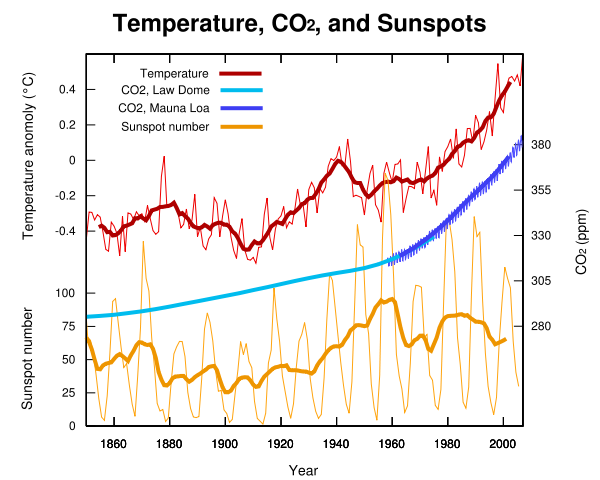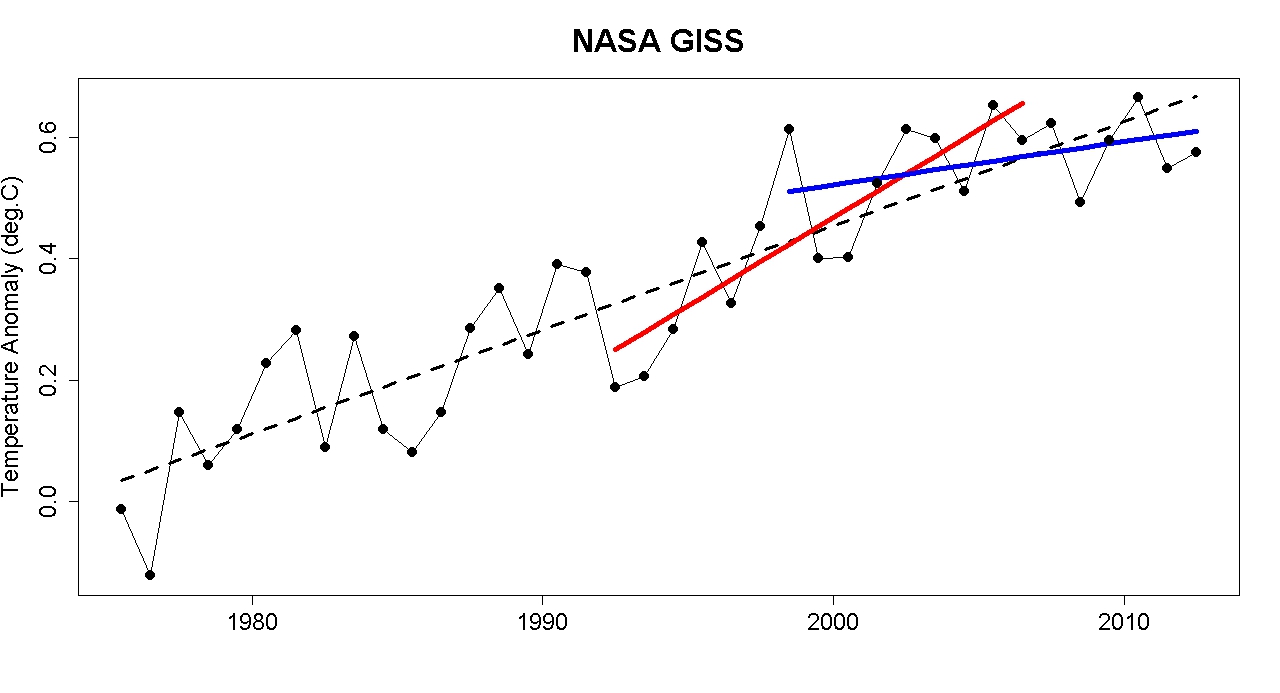-
1
- #1
i think the problems with burning fossil fuels are that we're returning carbon to the atmosphere at an unnatural rate, and that there was a very long interval between when the carbon was deposited from the atmosphere and when it's getting returned to it.
the second problem is meant to say that bio-fuels, which take from and return to the atmosphere over a short timescale, probably won't have the same effect on the global climate as compared to fossil fuels. Though, of course, once we start doing this on a global scale and derive meaningfull amounts of energy this way then there'll be unforeseen side effects.
i think it's reasonable to say that the global climate is changing; and that this would be happening even without mankind's contributions.
i think it's reasonable to say that atmospheric CO2 levels change with climate. i think the record shows that previously (say before the 20th century) that CO2 increased sometime after the global temperature increased.
i think it's reasonable to say that the amount of carbon we putting into the atmosphere has the potential to affect global climate. this is i think too wishy-washy "for the masses" so we're being told carbon is changing the climate ... maybe a simple message but one that has divided those wanting more explanation.
once you say that then i think it's reasonable to ask is this a bad thing, ie do we want to change ? We have to acknowledge that energy is the means to developing our economies. adding hydro, geo-thermal, wind and solar power aren't bad things ... there's a cost and a benefit associated. clearly there are some places that can really benefit for these (because of sustained sunlight or wind or water resources or etc). becoming more efficient in our energy consumption is clearly a good thing, though i suspect that won't gain us significant relief. i worry that developing economies are progressing along the same energy path that the developed countries have used, and that maybe there are "better" choices today.
we can't (won't) stop burning fossil fuels, we need the cheap energy. we can be a little smarter and make power stations more efficient but essentially we're dependent on fossil fuels. we're reluctant to persue the nuclear option, though i wish more research money was being directed at fusion power which i see as the only truly long term option.
it is IMHO nonsense to talk about reducing CO2 production to 1990 (or 2000 or whatever) levels principally because developing economies (China in particular, and probably India as well) are going to be burning more and more fossil fuels. carbon sequestration is also IMHO a nonsense technology unless you're talking about growing trees (and biomass). it is also IMHO nonsense to talk about sustainability ... truly sustainable energy would mean using energy resources at the same rate as they're being created (ie no fossil fuels or nukes) or available (solar, wind, hydro, geo-thermal). but then maybe that's one answer to the question, and we'll make truly huge investments in these "green" energies so that we'll increase the fraction of energy we derive from these sources, maybe enough to significantly reduce the carbon output.
if we're going to pay taxes on carbon (through whichever scheme you choose) ... where's the money going ? what's it doing to fix the "problem" ?
Quando Omni Flunkus Moritati
the second problem is meant to say that bio-fuels, which take from and return to the atmosphere over a short timescale, probably won't have the same effect on the global climate as compared to fossil fuels. Though, of course, once we start doing this on a global scale and derive meaningfull amounts of energy this way then there'll be unforeseen side effects.
i think it's reasonable to say that the global climate is changing; and that this would be happening even without mankind's contributions.
i think it's reasonable to say that atmospheric CO2 levels change with climate. i think the record shows that previously (say before the 20th century) that CO2 increased sometime after the global temperature increased.
i think it's reasonable to say that the amount of carbon we putting into the atmosphere has the potential to affect global climate. this is i think too wishy-washy "for the masses" so we're being told carbon is changing the climate ... maybe a simple message but one that has divided those wanting more explanation.
once you say that then i think it's reasonable to ask is this a bad thing, ie do we want to change ? We have to acknowledge that energy is the means to developing our economies. adding hydro, geo-thermal, wind and solar power aren't bad things ... there's a cost and a benefit associated. clearly there are some places that can really benefit for these (because of sustained sunlight or wind or water resources or etc). becoming more efficient in our energy consumption is clearly a good thing, though i suspect that won't gain us significant relief. i worry that developing economies are progressing along the same energy path that the developed countries have used, and that maybe there are "better" choices today.
we can't (won't) stop burning fossil fuels, we need the cheap energy. we can be a little smarter and make power stations more efficient but essentially we're dependent on fossil fuels. we're reluctant to persue the nuclear option, though i wish more research money was being directed at fusion power which i see as the only truly long term option.
it is IMHO nonsense to talk about reducing CO2 production to 1990 (or 2000 or whatever) levels principally because developing economies (China in particular, and probably India as well) are going to be burning more and more fossil fuels. carbon sequestration is also IMHO a nonsense technology unless you're talking about growing trees (and biomass). it is also IMHO nonsense to talk about sustainability ... truly sustainable energy would mean using energy resources at the same rate as they're being created (ie no fossil fuels or nukes) or available (solar, wind, hydro, geo-thermal). but then maybe that's one answer to the question, and we'll make truly huge investments in these "green" energies so that we'll increase the fraction of energy we derive from these sources, maybe enough to significantly reduce the carbon output.
if we're going to pay taxes on carbon (through whichever scheme you choose) ... where's the money going ? what's it doing to fix the "problem" ?
Quando Omni Flunkus Moritati



